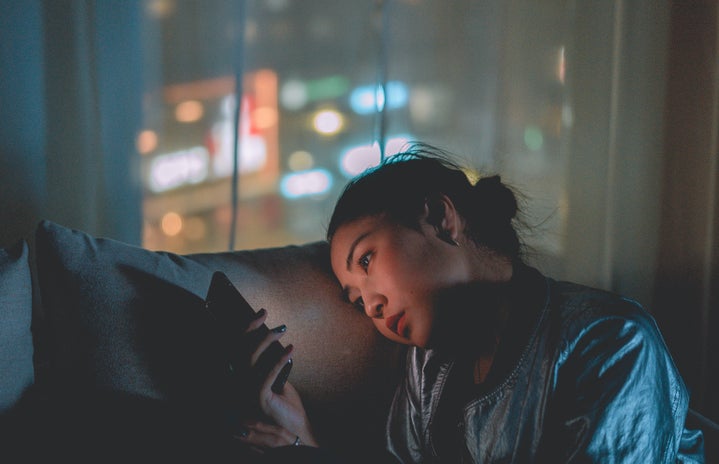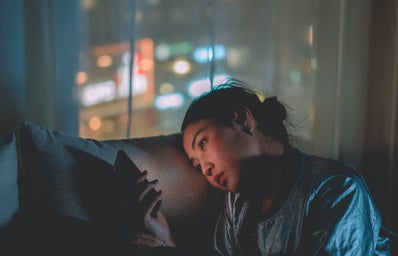It’s no surprise that college students often skip a few of the much-needed 7-8 hours of sleep per night, but is it really worth the toll it takes on your body? The short answer is: no. Bad sleep habits result in numerous problems, including a lowered productivity and variety of health issues. Avoid those 2 a.m. study sessions, stop opting for “just one more episode” on Netflix, and get some shut-eye. Here are a few signs that bad sleep habits might be impacting the rest of your day.
1. Feeling exhausted the second you wake up
It’s normal to feel drowsy when you first wake up, but that isn’t something that should last all day. Feeling exhausted shortly after waking up is a sign that your body’s internal clock is off.
“I can immediately feel it when I’ve been too busy to get a full night’s sleep,” Haley Brooks, junior at Colorado Mesa University says. “Usually it’s easy to jump out of bed and get started on everything I have to do that day, but it’s so hard to do that when I only slept for a few hours.”
According to Dr. Josna Adusumilli, neurologist and sleep medicine physician at Massachusetts General Hospital and Harvard Medical School, this is a common issue for college students. “I see a lot of college students with delayed sleep phase syndrome, where the body clock is shifted to a later bedtime and wake-up time,” she says. “This makes it harder to fall asleep at night and harder to wake up for early morning classes.”
2. Having trouble concentrating in class
We’ve all heard our professors’ advice to go to bed early and get plenty of rest before a big test, but how often do we actually follow through with it? Studies show that only getting a few hours of sleep the night before an exam can actually lead to a lower grade despite the extra hours spent cramming.
Dr. Adusumilli says busy schedules can put college students at risk for sleep deprivation, which can then affect their performance in the classroom. “Sleep helps consolidate memories and is important for learning, so it is important to avoid sleep deprivation and take naps during the day if needed,” she says. Naps? Count us in!

3. Feeling more awake after checking your phone
Scrolling through social media before falling asleep may seem like a great way to unwind at the end of a long day, but it’s actually stimulating your brain and keeping you awake longer. “The blue light from cell phones, iPads and laptops can alert the brain, making it harder to fall asleep,” Dr. Adusumilli says. “Additionally, if you read something interesting, exciting or bothersome on your phone or laptop, it may make it tough to unwind and fall asleep at night.”
Even though checking social media feeds may seem appealing, it’s best to wait until the morning to avoid disrupting your body’s normal sleep cycle. Having too much screen time at night can slowly lead to your internal clock being offset, which means you’ll continue having a hard time falling asleep every night.
4. Relying on multiple alarms to wake up
If you have to set several alarms to wake up in the morning and wind up hitting snooze a few times, your body is probably trying to tell you it needs a few extra hours of sleep. Dr. Adusumilli says college-aged women tend to have an irregular bedtime and wake-up time because of academic and social demands – which is something we’re all familiar with by now. However, by having such an irregular resting routine, it can be difficult for your body’s internal clock to adjust and wake you up in the mornings.
According to Dr. Adusumilli, improving sleep habits can be as easy as having regular sleeping times in order to “get enough hours of sleep and wake up naturally without an alarm clock in the mornings.” We’d still probably set a couple of alarms before a big exam just to be on the safe side.
5. Needing caffeine throughout the day
Grabbing a cup of coffee during the day is one of the easiest ways to perk up before heading into your next class, but this can actually be a sign that you aren’t having the best night’s sleep. Relying on caffeine to feel alert during the day can be an indication that you didn’t have a good night’s sleep, according to Dr. Adusumilli. She even says caffeine, as well as alcohol, can worsen sleep quality. However, this doesn’t mean you have to skip your daily Starbucks delivery. Registered Dietician Kaila Raygoza suggests limiting your caffeine intake throughout the day, as well as the time you consume it – maybe skip that late-night cup of coffee. If you find you’re relying on your latte to give you that little extra boost every day, it might be time to consider adjusting your sleep habits.
Finding the time to get the recommended amount of sleep is a hard task to accomplish. However, bad sleep habits can take a heavy toll on your body, so it’s a good idea to rest up and avoid the negative side effects that come along with staying up late.

